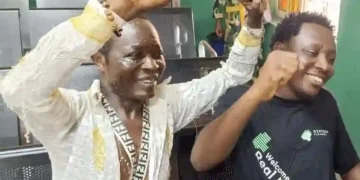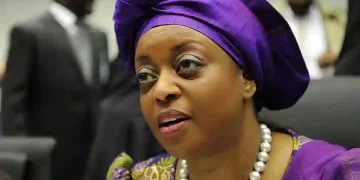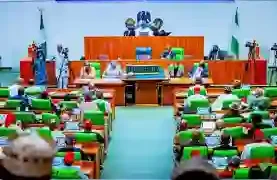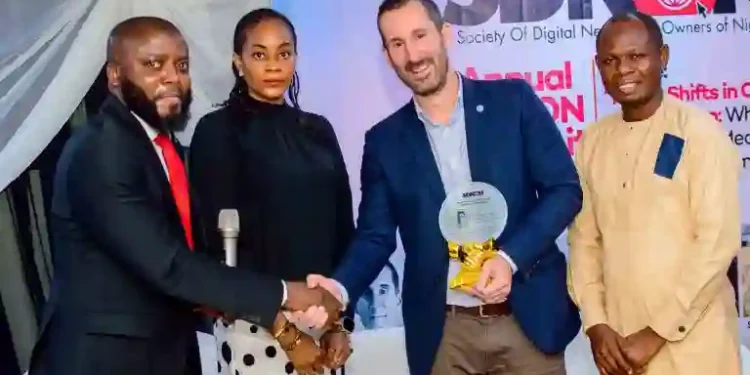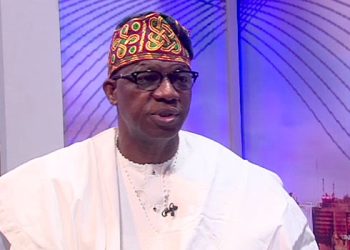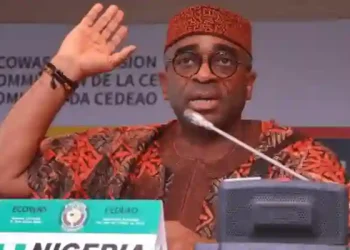The Society of Digital Newspaper Owners of Nigeria, SDNON, convened its 3rd Annual Digital Media Summit on November 13, 2025, at the Lagos Chamber of Commerce and Industry (LCCI) Conference Centre in Alausa, bringing together a diverse assembly of media professionals, technology specialists, and human rights advocates to deliberate on Nigeria’s rapidly transforming digital governance framework.
With Philips Renar serving as host, the summit centred on the theme: “Policy Shifts in Cyber Law and Taxation: What They Mean for the Media and Nigeria’s Economy.” Participants explored the implications of Nigeria’s Cybercrime Act, the anticipated 2026 tax reforms, and the responsibilities facing digital media practitioners as the country approaches significant policy changes and the 2027 election cycle.
Mr Shaba Gbenga, Vice President of SDNON, delivered the opening address on behalf of the association’s leadership in the President’s temporary absence. He underscored the urgency for media practitioners to comprehend and prepare for the sweeping regulatory transformations scheduled for implementation in 2026, emphasising their significance to the industry’s future operations.
The summit featured Bill Killorn, Executive Director of Journalists for Human Rights (JHR), a Canadian non-governmental organisation with international recognition for enhancing the capabilities of journalists, media organisations, civil society institutions, and related bodies in human rights advocacy and democratic governance. Killorn’s address focused on responsible journalism’s essential function in protecting democratic principles against the backdrop of increasing regulatory constraints.
SDNON honoured Killorn with an Award of Excellence in acknowledgment of his global contributions to media development. The award presentation involved SDNON Vice President Gbenga Shaba, Public Relations Officer Kanyinulia Okeke, and keynote speaker Barrister Q.A. Afolabi.
The summit’s intellectual framework rested on two comprehensive keynote presentations:
Barrister Q.A. Afolabi, Esq., a recognised authority in digital policy, analysed current and anticipated developments in cyber law, focusing on their ramifications for press freedom, digital content regulation, and accountability mechanisms.
Christopher Dike (ACTI), a chartered taxation expert, delivered a crucial analysis of Nigeria’s forthcoming tax reforms, detailing their expected economic consequences for media organisations and the wider digital sector.
The first panel discussion, with Olufisola Ige-Lahanmi serving as moderator, examined the Cybercrime Act’s extensive impact on journalism and freedom of expression. The panel comprised:
Mr Kehinde Adegboyega, a human rights activist, argued that the Cybercrime Act has been improperly implemented in a manner that endangers constitutionally protected freedom of expression. He referenced cases of journalists detained without proper warrants under cyberstalking accusations and demanded immediate legislative review.
Jumoke Falayi-Johnson, President of NAWOJ (Nigerian Association of Women Journalists), brought attention to the escalating pattern of technology-based gender violence targeting female journalists. She disclosed that 73% of women working in the industry have suffered online attacks, with 10–20% of these incidents progressing to physical threats. She encouraged journalists to prioritise their safety and seek protection through membership in professional associations.
Mr. Onoride “Onos” Akusu, a public relations expert, advocated for communication professionals to educate their clients on data protection protocols, develop audience communities, and retain control over brand narratives to mitigate reputational damage.
The second panel discussion, moderated by Seunmanuel Faleye, concentrated on Nigeria’s new taxation policies and generated substantial audience engagement. Given that the new legislation will become operational in 2026, attendees posed numerous questions regarding its effects on digital publishers, content creators, media entrepreneurs, and small business operators.
Panellists Christopher Dike (ACTI) and Allison Olusegun Chucks offered clarification on compliance obligations, available exemptions, and the wider economic ramifications of the new tax structure.
Students from the Nigerian Institute of Journalism (NIJ) demonstrated active participation throughout the summit, engaging panellists with insightful questions and acquiring direct exposure to the challenges and opportunities defining Nigeria’s evolving media environment.
SDNON President Adeniyi Ifetayo, who arrived later in the program, addressed attendees regarding the association’s strategic vision and the critical role digital publishers occupy in influencing national discourse.
Former SDNON President Otunba Femi Davies also delivered remarks, stressing the importance of adequate preparation for the new tax policy scheduled for implementation in 2026.
The summit attracted strong representation from allied organisations and professional bodies, including the Nigerian Guild of Investigative Journalists (NGIJ), Nigeria Association of Social and Resourceful Editors (NASRE), and League of Online Publishers and Editors (LOPE).
Viju provided beverage sponsorship for the event, helping to sustain participants’ energy throughout the sessions.
In his closing remarks, Mr Wale Onifade, Chairman of the Planning Committee, expressed gratitude to all attendees for their active engagement and wished them safe travels to their respective destinations.

Seunmanuel Faleye is a brand and communications strategist. He is a covert writer and an overt creative head. He publishes Apple’s Bite International Magazine.



